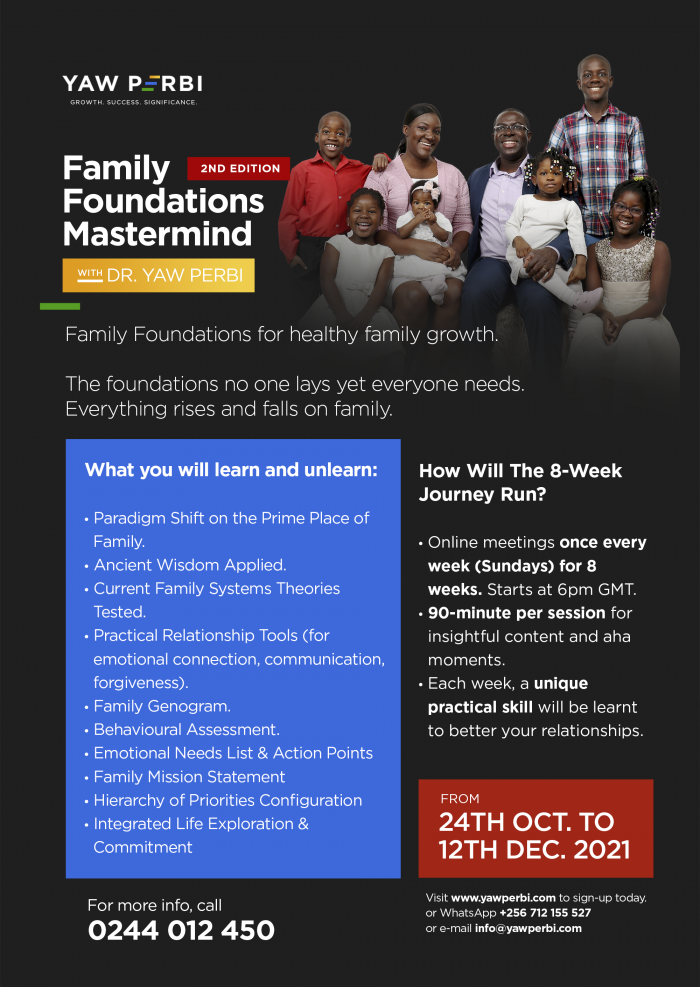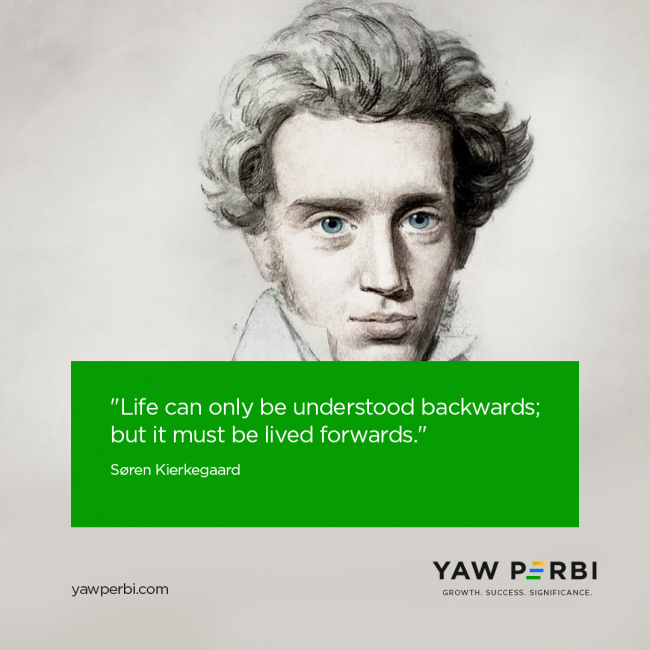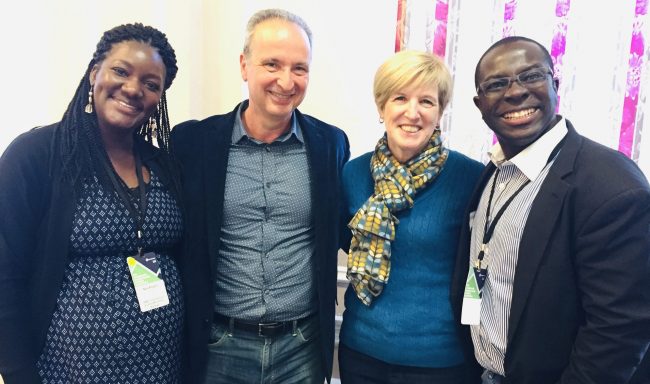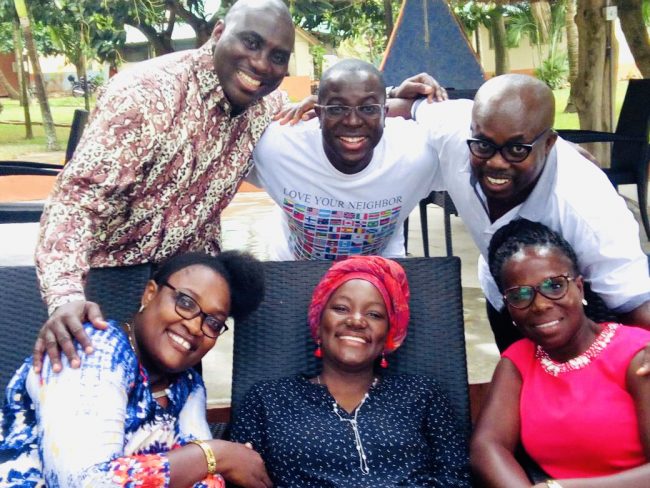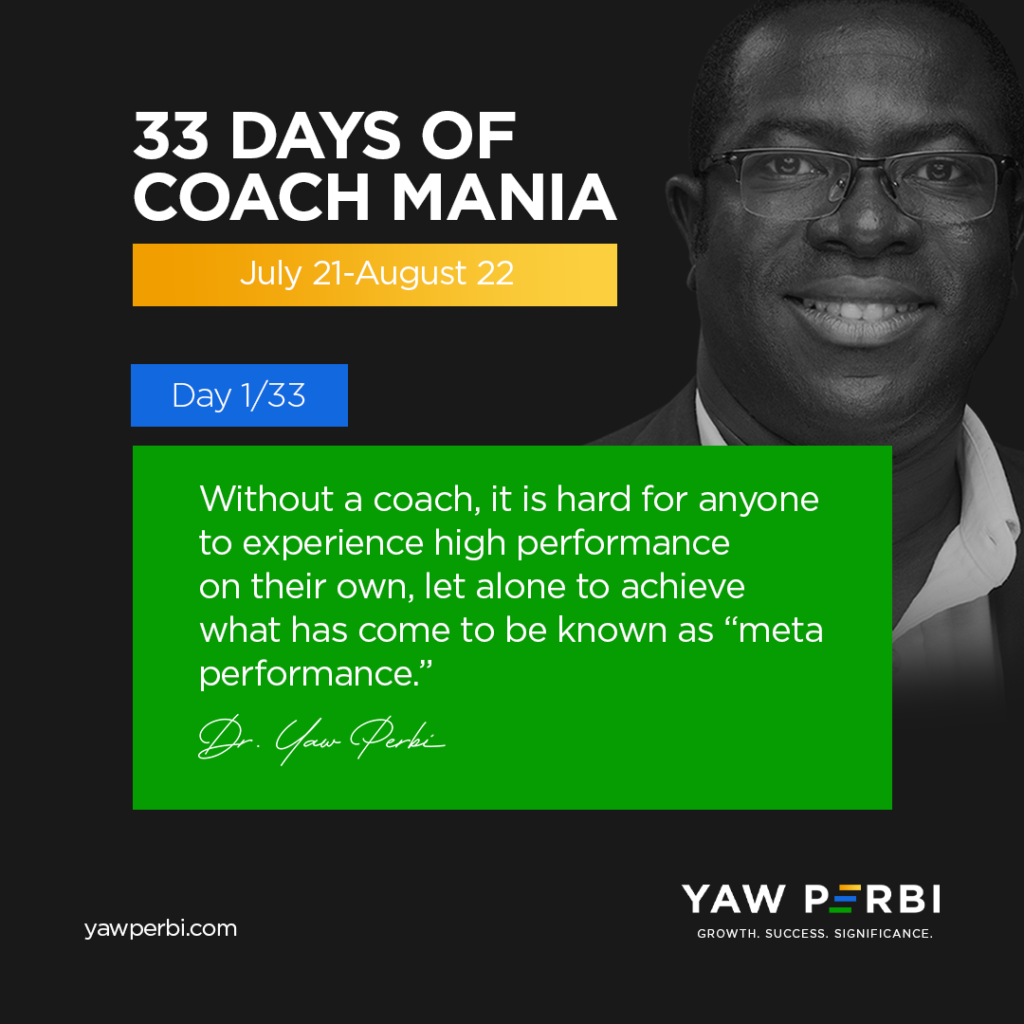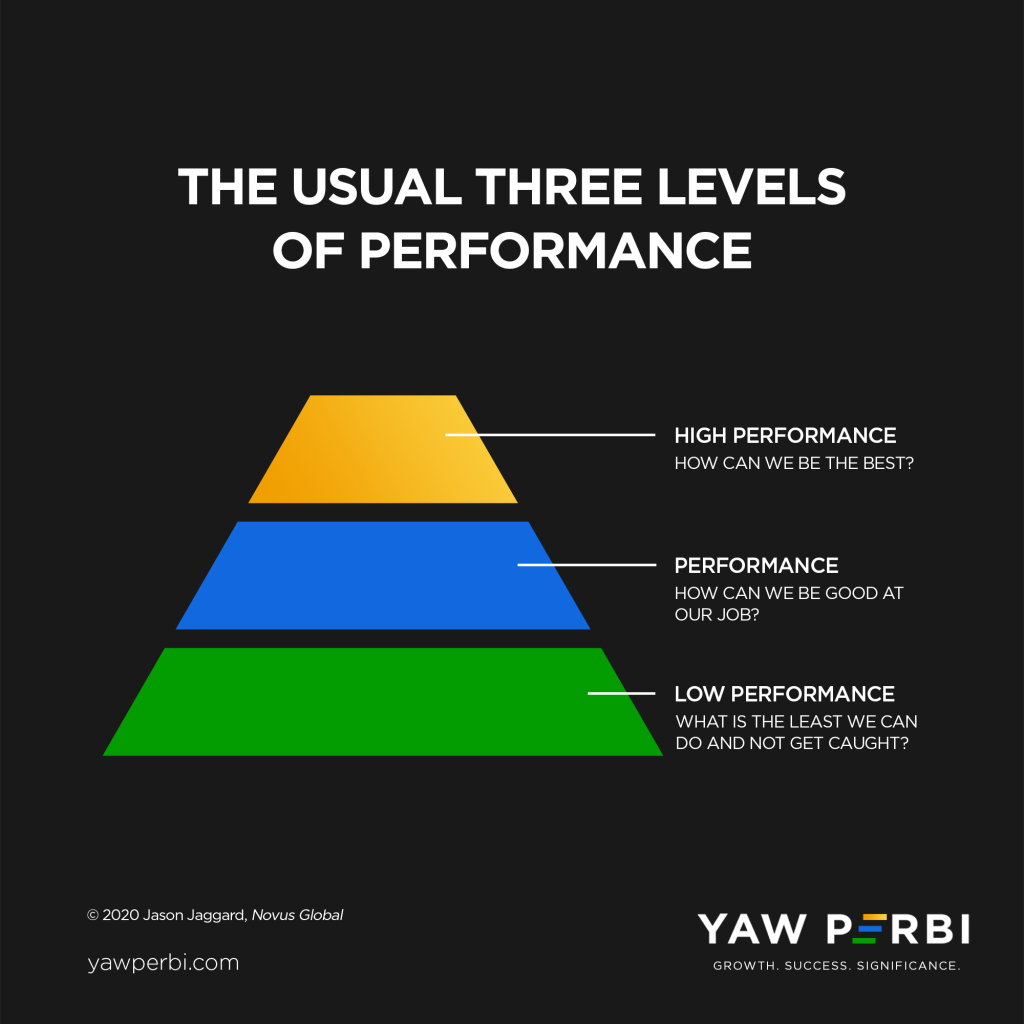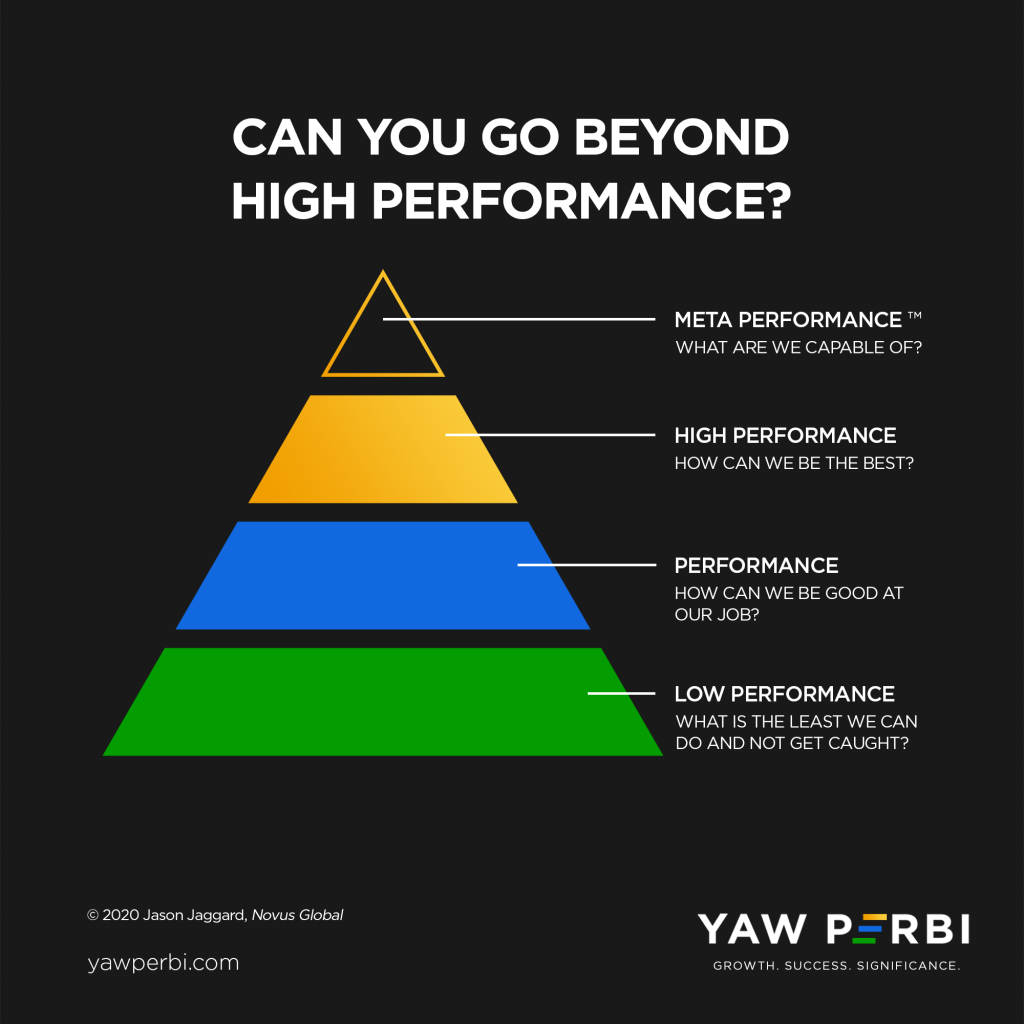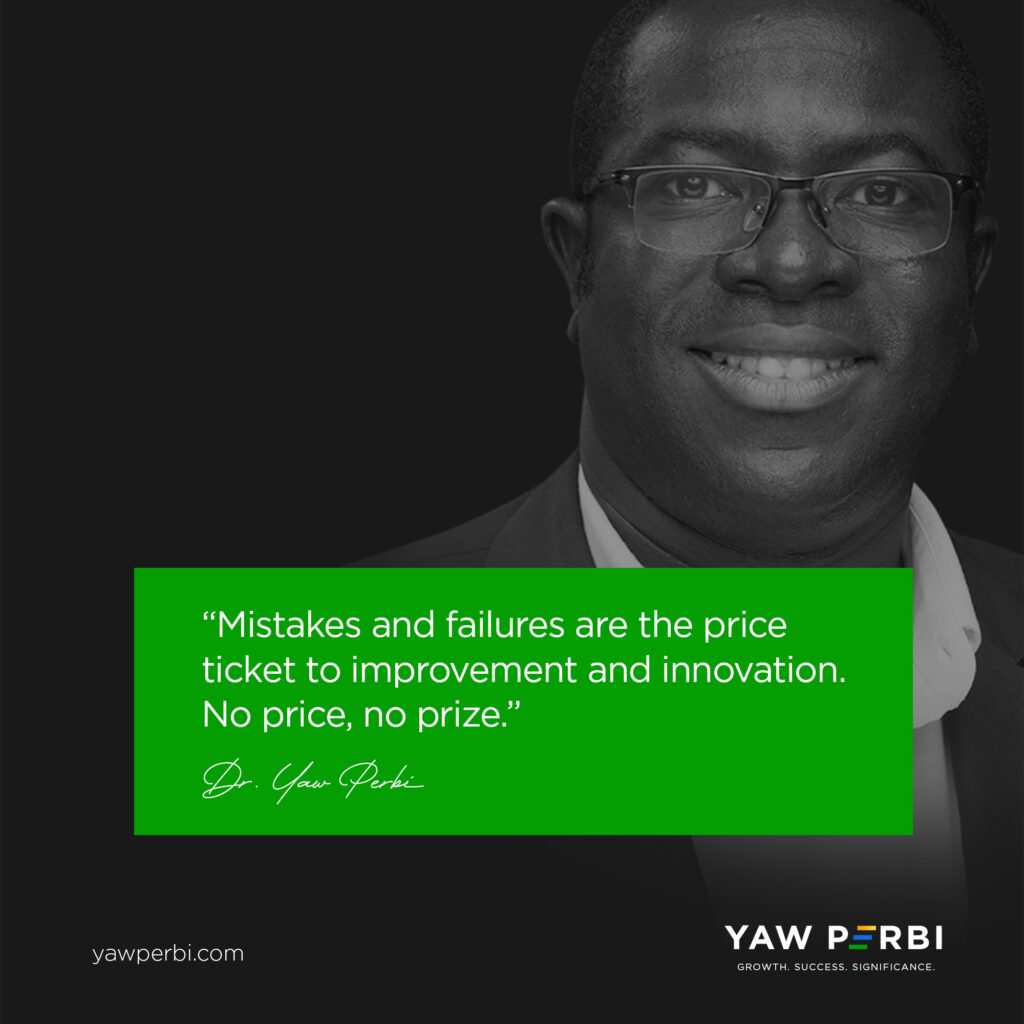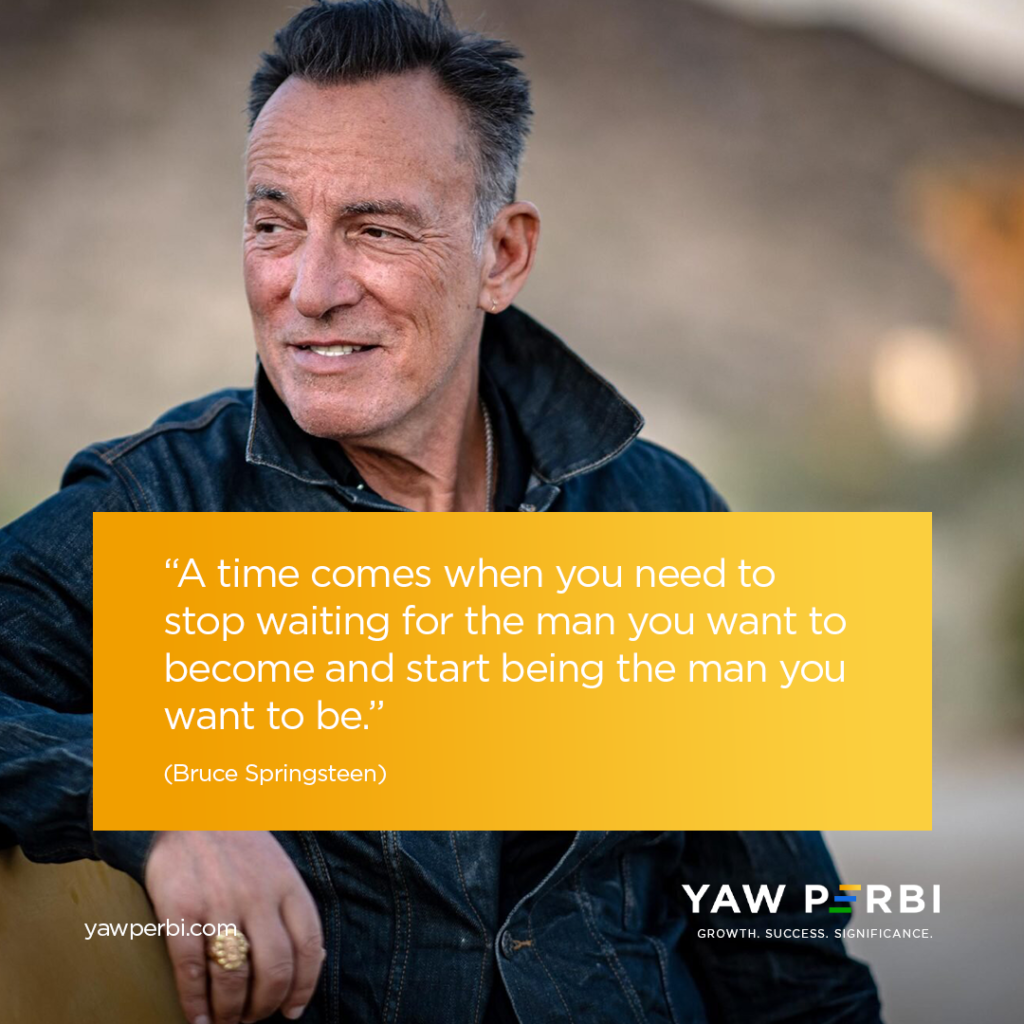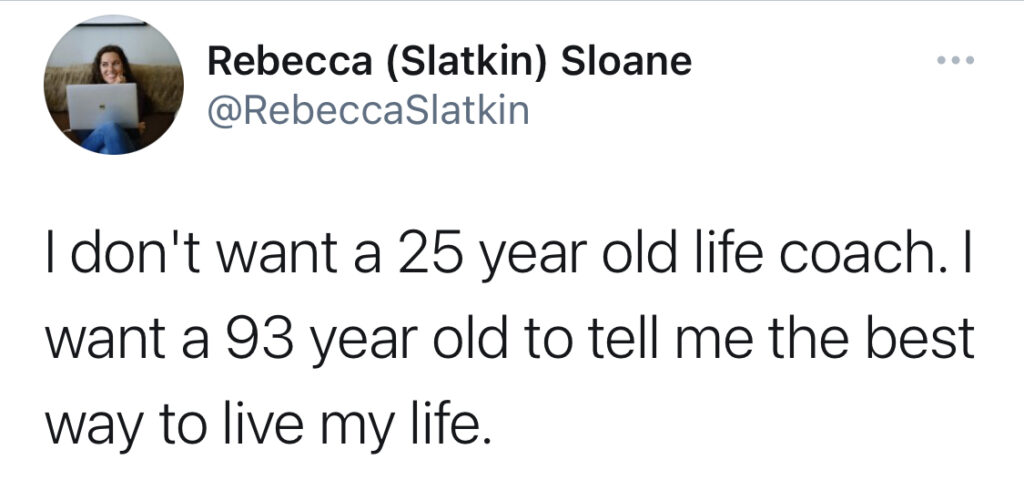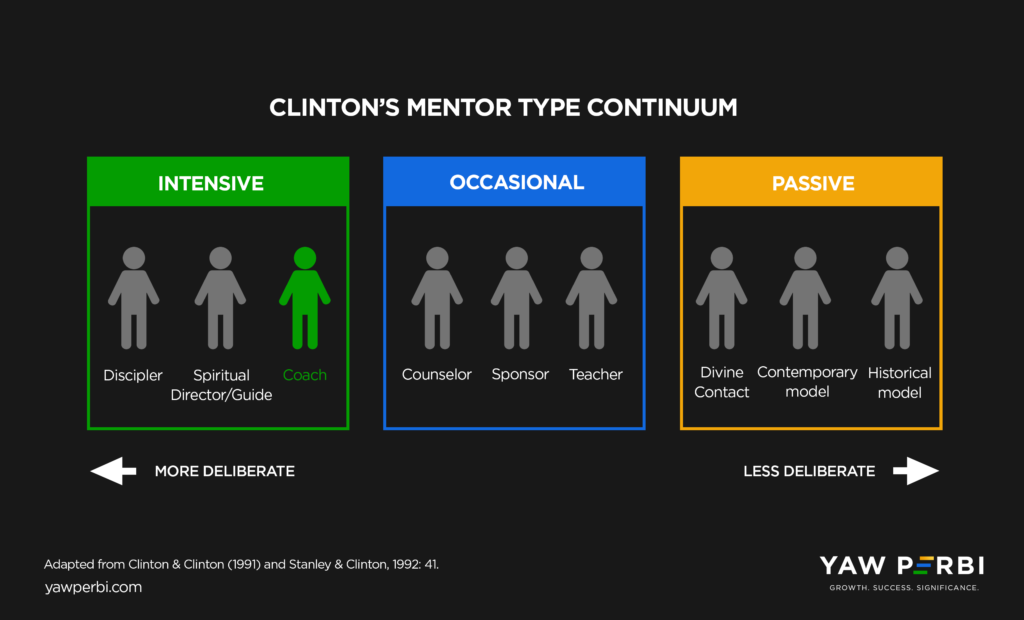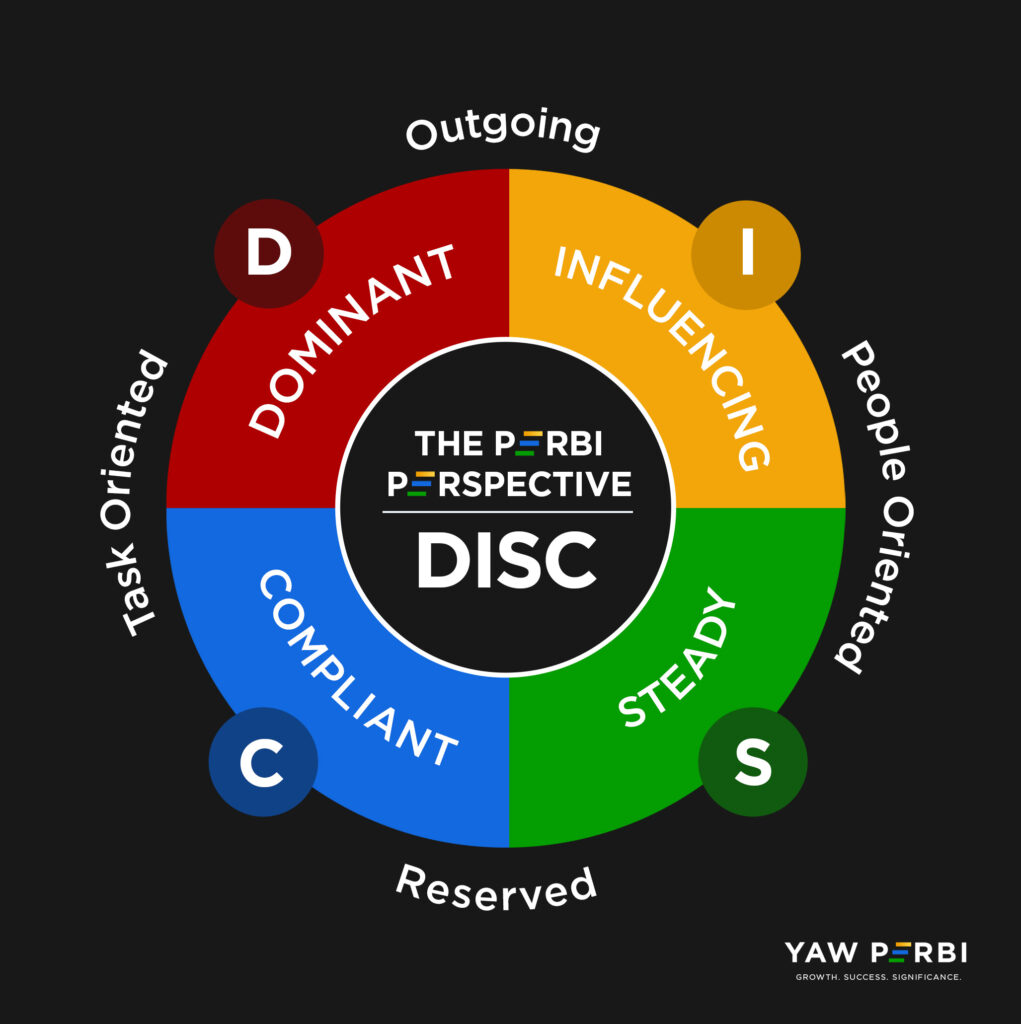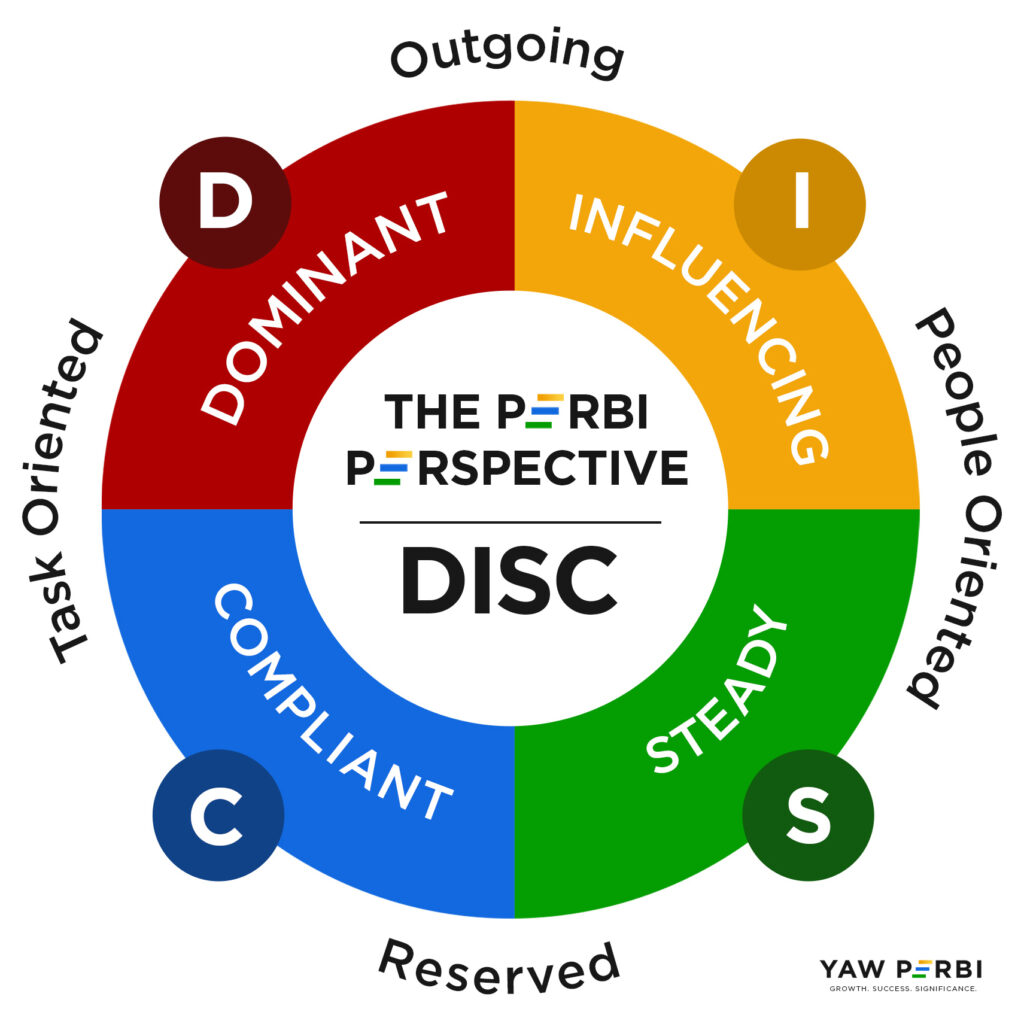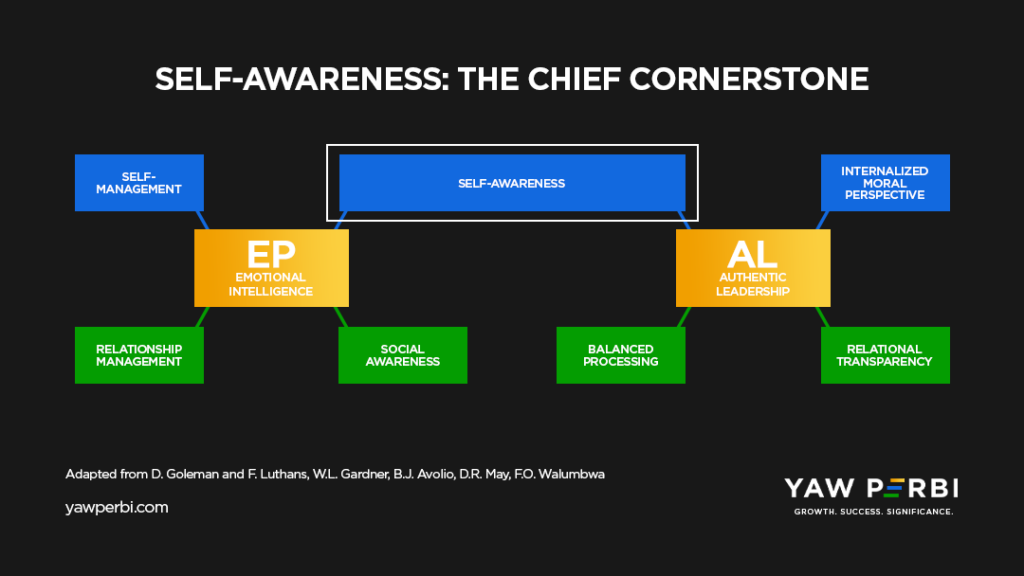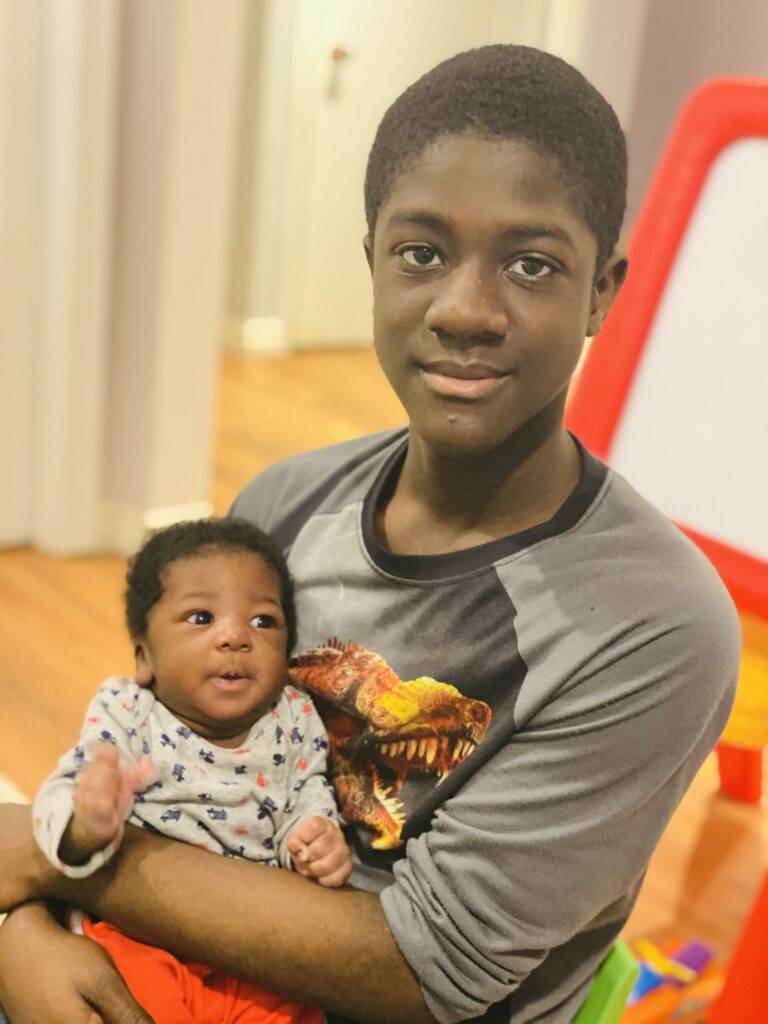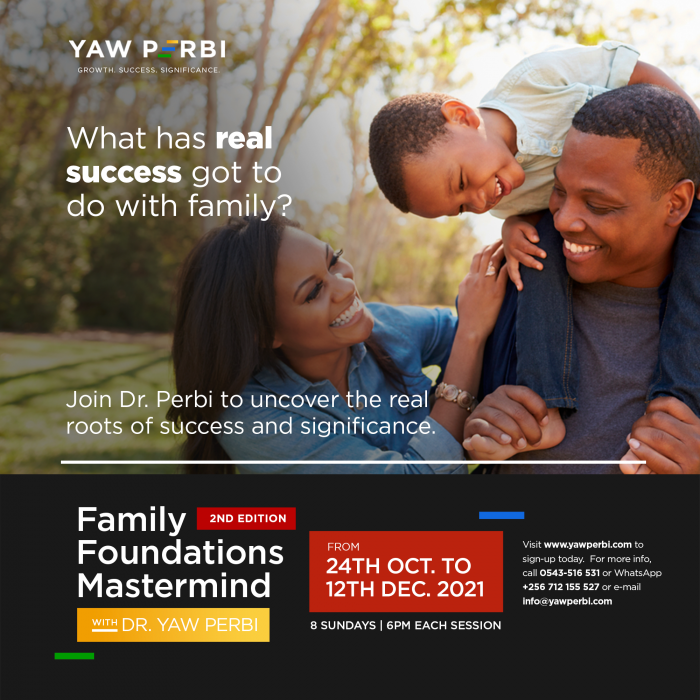
Family Foundations and Success: Will Your Anchor Hold?
We live in perilous times. Don’t you sometimes feel like the world is spinning out of control ? One of the most important things we must cherish and hold on to is family. Every single one of us has a family–no matter how (dys)functional and emotionally or geographically removed. The family is the fundamental unit of human existence. Nothing good happens on Earth if it is broken or destroyed. A society is only as good as the families that constitute it.
It is not only the concept of family that is important but also the actual living out of what family should be. Humans are described as social creatures. We make friends, live in communities, and connect with strangers based on common elements. Social media has recently emerged as a new way for people to connect with childhood peers, friends of friends, and even strangers. Nothing is more central to social life than the concept of family. Our families represent our earliest and, often, most enduring relationships.
Earlier this year, a Family Foundations Mastermind was held, with a sizeable number of couples (and some individuals) participating. All present could see that there are important things everyone should know, be, and do about the family yet no one had done! How can we expect family to be strong and stable if we ignore the fundamental roles of human existence? As a result, a popular request has been made for it to be repeated, even though we had planned this quarter to run a Financial Whizzdom Mastermind, which many were anticipating. We apologize for any inconvenience, but signing up for the upcoming Family Foundations Mastermind would never be a mistake.
With what is going on around us in this LGBTQI+ era, there is an urgent need to apply ancient wisdom and put current family systems theories to the test. The abiding questions in the 19th century hymn Priscilla Owens come to mind:
“Will your anchor hold in the storms of life, when the clouds unfold their wings of strife?When the strong tides lift, and the cables strain, will your anchor drift, or firm remain?”
We encourage everyone to participate in this mastermind as it will be both enjoyable and educational. We will explore:
Why a systematic study of family itself is important
The prime place of family (get ready for paradigm shifts!)
Ancient family wisdom (we’ll apply these)
Current family systems theories (we’ll test some)
Basic tools for emotional connection
Essential communication tools
The forgiveness exercise
Unique emotional needs and how to fulfill them
Mapping out your family genogram
Drawing up a family mission statement
Prioritization: Recognizing the place of work, family, friends, church/community, and other responsibilities that require your attention.
The idea of the integrated life over the notion of balance
And much more!
Note that this is not a masterclass but a mastermind. Inasmuch as there will be some core teaching, more central will be the concepts and tools that are put on the table for everyone to contribute their perspectives and experiences and practically learn together things together that no one could have taught us. Dr. Yaw Perbi is a guide by the side in masterminds rather than a sage on the stage, typical of a masterclass.
WHAT’S SUCCESS GOT TO DO WITH FAMILY?
Everything. As John C. Maxwell poignantly puts it, success is when the people who know you the best (family) love and respect you the most. Join this journey of growth to discover the real roots of success and significance. Family is essential. Whatever we see in society has a direct correlation with family. The family is the fundamental unit of society and humanity. We can discuss all seven sectors of life or spheres of influence, but only family actually produces human beings. Come learn how to be a better family member and how to be/do family better.
We are excited to have you. Register via this link as soon as possible. First come, first guaranteed.

4 F’s for Finding the Right Life Partner
A special shout out to Naa Anyele Perbi, my wife, economist-entrepreneur and CEO of Perbi Cubs. It’s my wife’s birthday (October 3), my wife of 15 years and counting, and as I celebrate her it seems to me that the rest of the world could benefit from 4 F’s that are critical in building a lasting marital relationship a.k.a. life partnership. Marriage is tough in and of itself and so starting with the ‘wrong’ partner is literally starting on the wrong foot. Anyele and I have been asked “how do I know for sure this is the right life partner for me?” so many times that we’ve distilled the answer down to a simple 4 F criteria. Of course, you could have 100 characteristics of the (wo)man of your dreams–why not?–but if you get these four wrong, forget the other 96!
Now, this is not just for young(er) people. Increasingly many people are getting married later in life but not just that, stuff happens. There are those who marriages end sooner than they had hoped and choose to remarry–and want to have a partner that will last this time. Here are our four: faith, future, friendship and feelings.
(1) FAITH
Faith is number one because it drives everything else. I’ll explain: people do not realize that our entire existence and behaviours our shaped, driven and undergirded by values, which in turn are determined by our beliefs (or as some call them, ‘faith assumptions’) which at the very core come from our worldview!
There is a lot of talk about values-based this and values-based that but values are only fruits of the tree; the roots are fundamental beliefs in the fertile soils of worldviews. So what kind of faith do you subscribe to, or no faith? I know people try to cross faiths, like Christian and Muslim marriages, but we really believe it is important to share a common faith because then you have a common worldview, common belief system, and common values which should lead to common behaviours to do life together that lasts, with unnecessary tensions and fight.
The apostle Paul, who incidentally never got married, waxes lyrical about this to the Christ followers in the ancient Greecian city of Corinth. He pulls no punches as he gives it to them straight up: “Do not be unequally yoked with unbelievers.” For Christians who are true disciples of Christ, the reasons and reasoning I’ve provided above which must’ve informed this command, in additional to spiritual reasons he gives in the text, may be useful to know but obedience nevertheless is the highest value in the kingdom of God. It’s also known as love for God.
(2) FUTURE
You may be two people of the same faith (so values, beliefs and worldview are in sync) but if you are going in two different directions in life, it’s not going to work. First it’s a tension and soon it’s a tear. And this has nothing to do with someone being a ‘bad person’ or the other having ‘no love’ but just because you have two different life purposes that aren’t complimentary let alone synergestic. By future we are talking about purpose compatibility. Two people may have common faith but if they are traveling in two different directions because they were made for two different destinations and destinies, the marriage partnership won’t work. I like the way a friend put it: “we are good; but we’re just not good together.”
Everyone has a specific God-given purpose that must not only be discovered but developed and fully deployed if we are to feel fulfilled. It doesn’t mean both must be doing the same sort of work or in the same field even (all they better if they are). It just means they have the passion and compassion (and perhaps even talents) to contribute to the purpose. Being fulfilled can be described as getting oxygen, and you know how any human being will instinctively fight for air if they are being choked. A life partnership will never work even if you are two people of the same faith yet moving in opposite directions, or towards different destinations and destinies.
It is critical that you discuss the future and truly understand what you are getting involved in during courtship. During courtship, the lips are for talking primarily, not kissing. You can never suck information from the mind of another no matter how much you French kiss a loved one! Decide to go into details about where you’re headed and how you envisage life in the coming years. It is not for nothing the good book inquires, “Can two people walk together unless they agree?”
(3) FRIENDSHIP
Friendship is the cornerstone of a lasting relationship, and a good friendship is intentionally formed over time. One of life’s greatest pleasures is friendship. Friendship is wonderful because it is one of the few relationships in life that fosters equality and mutuality. Almost every relationship in the world has a power differential, someone one higher than the other; not so with friendship.
If the creation account is true, then man and woman were made for each other for companionship (friendship) even before parenting for their life’s work (‘future’ above) or procreation. The other thing is that emotions come and go, but friendship endures and transcends the passage of time. Affect(ions) alone cannot always sustain a marriage. Friendship with all it entails is a truly priceless relationship. Life can become monotonous if we do not have some true friends to share it with.
It’s so cute to find an elderly couple who are truly friendships–the body language, the mannerisms. I’ve met many people, especially young ladies, who somehow seem to believe that they will never be able to marry their friends. Au contraire! Marrying your friend is the best decision one could ever make!
(4) FEELINGS
Finally, feelings are the icing on the cake of a life partnership that literally lasts a lifetime. Emotions are extremely important and should never be overlooked. They are powerful. They are called e-motions for a reason. They move us. There is a need to feel and this is a requirement for you and me to be exceptionally attracted to our partners. There must be a special thing that draws you to the individual and creates a natural flow between you two. Call it ‘chemistry,’ if you will, or that the person lights your fire. There is a need for connection and a spark between the individuals. It is key because you’ll be waking up by the side this person almost every morning for the rest of your life–you had better get some kick out of that!
There tends to be two extremes when it comes to the role of feelings in choosing a life partner. There’s the feelings don’t matter camp which gets it wrong (of course they do!) as well as the feelings first (or even feelings only) base as well. We absolutely need the feelings to make any life partnership last, but I won’t make them first or foremost. Take a look at Hollywood: more than half of the hunk-ness, über beauty, sexiness and extreme marriage proposals (on helicopters and such) result in divorces within months. Months!
Feelings are important but there aren’t everything. I remember learning 25 years ago when I was a World Vision Youth Ambassador that generally people in the West marry the one they love (have feelings for) while those in the Eastern hemisphere love the one they marry. Even arranged marriages can work if they get the first three F’s right. The fourth ‘F’ can eventually come along. In fact, many of them outlast the so-called “love marriages’ which largely focus on just the fourth ‘F.’
FINALLY…
Many people I know have a long list of life partner criteria. Every one of those lists can be divided into two: essentials and desirables; or non-negotiable and negotiable. You can add a whole list of both categories to Faith, Future, Friendship, and Feelings but these four are non-negotiables. You can have an expanded list of 100 criteria but you cannot do without these four–not if you’re serious about a life partner for a lifetime. Ascertain that these 4F’s are in place for a future with your partner that has a lifelong glow and not just a shooting star. The quality of the information you have directly impacts the quality of the decisions you make. You are in charge, therefore, make the best decision. See you at the summit!
Please share your thoughts and experiences too!

Life is lived forwards but understood backwards
Life is lived forwards but understood backwards. That sounds very much like one of those witty sayings from my bank of African proverbs but the person I read that from first was the Danish philosopher Søren Kierkegaard. In his own mother tongue “Livet skal forstaas baglaens, men leves forlaens,” translates into “Life can only be understood backwards; but it must be lived forwards.”
In a recent conversation with my brother and friend of nearly two decades, Rev. Albert Ocran, he prophetically said to me without butting an eyelid that when he looks at my entire life it can be distilled into one word: leadership, to which I replied with my head bopping like an agama lizard, “That is true, you are right!” (By the way I have given him the title, “Thought Distiller.” He’s doing a wonderful job distilling the life lessons of several leaders in society for the general public on his Springboard Road Show.) Albert is one of the few who ‘gets’ my life, probably because he is an ardent believer in something he himself calls “convergence.”
I have been accused by some of living a scattered life (“all over the place”) while others have expressed concern I might not make much of a dent in the universe (impact) because of how spread my life has been (and continues to be?). I have been a medical doctor, award-winning speaker, punching preacher, best-selling author, publisher, military officer, U.N. peacekeeper, cross-cultural pastor, serial entrepreneur from media to real estate to education, president & CEO, television presenter, financial advisor, investment consultant, founder of many things, corporate trainer, life and executive coach, inspirational teacher, lived in three countries over the last dozen years and served in 45 … So who are you, what are you? people wonder. Although I owe no one an explanation except the One who gave me life, permit me to share two pivotal paradigms, nay convictions, with you.
(1) META-PERFORMANCE–Milking Your Full Potential
First of all, there is the notion of meta-performance. Many of us never explore or exploit our full potential because we get stuck in being the best at something in comparison with others, rather than constantly exploring the question, “What am I capable of?” There is no reason to be stuck in a hospital because I was trained as a medic when I have the ability to author books as well, something the majority of my med school mates may not have the aptitude for. Shall I therefore not write because other doctors cannot? I resolved when I was but a youth, as entrenched it in my personal mission statement, to “die empty.” To die having utilized and exhausted every gift in me, but now I add, “within my God-given limits.” After all, like you I have only one life to live and have only 24 hours in each day. Besides, with a wife and seven children, family is a blessing which comes with its own limits as well.
Suffice it to say I encourage the youth in particular to spend their first 30-35 years at least, exploring and exploring and exploring until they finally hit oil. Don’t forget the parable of the talents: one was given five, another three, and a third servant, one, each according to their ability. Why should the chap with five compare himself with the person with one and underperform? As has been wisely said, the talents we have are God’s gift to us; what we do with them is our gift back to God. Meta-perform!
(2) CONVERGENCE–Connecting the Dots
But I digress, which is funny because the point I want to make next is about (a word that Albert loves): CONVERGENCE. We all must get to a point in our lives when we can look back and connect the dots, and see that all these seemingly scattered and unrelated aspects of our lives, including the lows and the pains, can all really come together to make one huge statement and result in an integrated life. The reason Kierkegaard’s words speak profoundly to me is that when I reflect on my seeming scatteredness, when I look backwards, I see that the many different-coloured strands have a common thread: leadership. That is why I doff my hat to Albert for being so spot on. I have not been called to be a medical doctor or military officer or media man or investment guru per se but a leader in every sphere I’ve been given talent and opportunity in. Is leadership a career? If it is then, then that’s mine. If it isn’t then I do not have a career.
The late Apple founder Steve Jobs put this Kierkegaard philosophy of looking backwards and Albert Ocran’s love of convergence into a very powerful statement: “Again, you can’t connect the dots looking forward; you can only connect them looking backwards. So you have to trust that the dots will somehow connect in your future. You have to trust in something—your gut, destiny, life, karma, whatever. This approach has never let me down, and it has made all the difference in my life.”
BACK TO THE FUTURE
This issue speaks to a powerful leadership practice we must all have: reflection. Reflection, really, is the rhythm of leadership. There is no understanding without reflection. Unless we lead from a place of pause, we will not be able to distill the lessons in life. Not only will we miss out on ourselves, others and even life itself but also our lives and leadership will be shallow. Take it from a guy who is almost always busy running around and has been described by my nonagenarian mentor in Britain as peripatetic. I’m learning more and more to be in solitude and silence, otherwise there is no understanding of the life lived or the thrill of the act of connecting the dots. I would wish that we all, like Aleksandr Solzhenitsyn, can say after our own backwards reflection, “later the true significance of what happened would inevitably become clear to me, and I would be numb with surprise.”
The fuller philosophy of Kierkegaard is this: “It is really true what philosophy tells us, that life must be understood backwards. But with this, one forgets the second proposition, that it must be lived forwards. A proposition which, the more it is subjected to careful thought, the more it ends up concluding precisely that life at any given moment cannot really ever be fully understood; exactly because there is no single moment where time stops completely in order for me to take position [to do this]: going backwards.” Don’t keep looking only in the rearview mirror, that’s not where you’re going. But surely do look into it momentarily from time to time for the wherewithal to live and lead forwards with meaning. Life is lived forwards but understood backwards.
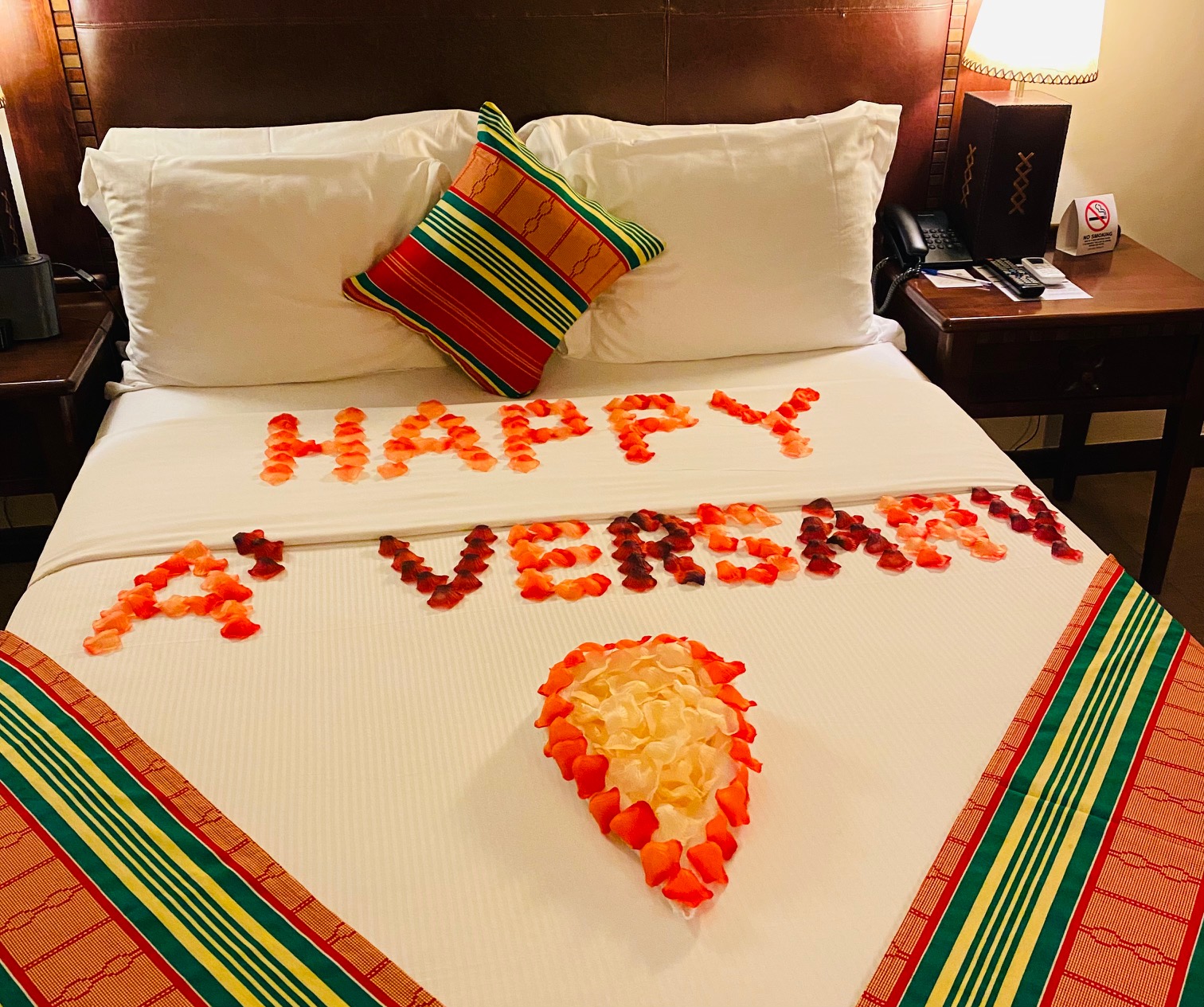
3 Secrets to Lasting 15 Years in Marriage
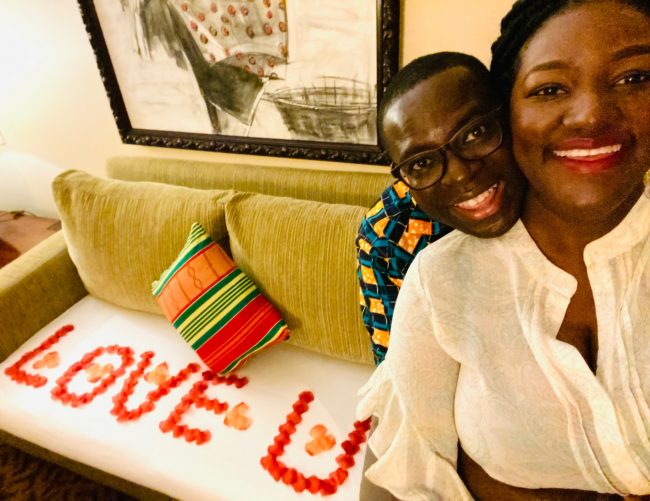
15th anniversary chilling at the African Regency Hotel, thanks to ‘friends in high places.’ Anyele was totally stunned by the decor 🙂
First of all, my wife (Anyele) and I humbly acknowledge that “15 years is nothing” compared to our parents’ (both sets) over 40 years of marriage and the 70 years some awesome couples we’ve come across have done! Wow! That’s incredible! Yet at the same time “15 years is something” considering that we’ve also come across marriages that were done, finished, caput, in months. In our short 15 years we’ve seen so many do shorter than five years, let alone 10. Fifteen? We’ve tried. We’ve even been used by God to salvage some marriages but have also heartbreakingly seen others dashed right before our eyes despite our efforts.
Secondly, I’m very wary of ‘3 secrets,’ ‘7 keys,’ ’10 ways,’ ’12 steps’ and what have you. So why am I sharing ‘3 Secrets to Lasting 15 Years in Marriage’? Well, Anyele and I just clocked 15 years on August 12, 2021. For us, the bottomline is God’s grace–and right from the start Prof. Kwaku Osam of Legon Interdenominational Church had told us during our pre-marital counselling sessions that “there is a grace for marriage” and we claimed it–in good measure. Maybe it’s true after all, but the thing about grace is that it works; and it has to be worked. Allow me to share three means of that grace for marriage that have made us largely survive (and even thrive in certain specific areas). No, I wouldn’t saddle you with ’15 lessons I have learned in 15 years of marriage’ so be grateful for just three (Lol!).
When we clocked 10 years the main thrust of our marriage lessons thus far was that marriage is the greatest character-forming school ever–even more than med. school. I’ve been to both marriage school and medical school so trust me, I know what I’m talking about! We called it the #1 Marriage Lesson That Nobody Talks About Much. That blog really seemed to resonate with the 50,000 or so it reached within weeks, thanks to social media, and was reproduced on some prominent news agency websites. It made me realize I shouldn’t play down on these key lessons, no matter how few and unwow, no matter how seemingly insignificant, no matter how humble they may be. You might scorn them; they might be life-saving for someone else.
Between year 10 and year 15, we have seen many people get married. Sadly we’ve not only seen many separations first-hand, we’ve witnessed more finalized divorces than within our first 10 years–real people, not just statistics. These three things I’m going to share have been a means of grace for us to do 15 years, especially the last five: Caring Counsellors, Close Cohorts, Cool Tools.
CARING COUNSELLORS
The most stupid thing I’ve done in marriage has been to not seek professional counselling till after year 10. We certainly have never brought any marital issue to any of our parents–it’s a no, no for many reasons that warrant a whole blog. I’ve come to realize, though, that there are certain issues that can never be well resolved between just the couple without a third wise party who is close enough (caring) yet far enough (outside the cleavage of man and wife) to be able to see clearly and share candidly. The notion, or even culture, that suggests that seeking professional counselling means one is weak or sick is toxic, it kills. Even if one were weak and sick, that’s fine too (everyone is at some point in our frail humanity and wretched world). We have seen people reach out when it was too late to salvage a totally hitherto salvageable situation (in our opinion).
Whether it’s through our conversations, their conferences or media (from books to YouTube videos), we really want to thank God for giving us the benefit of having Pete & Geri Scazzero (see picture above), Gerry & Kathy Kraemer, Carsten & Linda Pellman and indeed Shepherd’s Heart Ministry.
Apart from the listening ear, emphatic heart and vulnerable sharing of these caring counsellors, the ‘cool tools’ we’ll be sharing shortly have largely been learnt from them. An underlying paradigm that has buoyed everything else has been the Scazzeros ramming into our heads and hearts to lead in ministry and the marketplace out of the strength of our marriage, not out of the stress/strain of it–or even the death of it.
Of every single one of the divorces I’ve witnessed at close range, the couple did not have clear, regular, serious mentoring relationships. It’s worse when the man especially submits to no one on earth and is a law onto himself. Ha!
CLOSE COHORTS
You think the things you’re going through are unique to you until you are vulnerable to share with a close community of others. This must be a close community you can be vulnerable in because you are contemporaries (all in a similar stage in life), and are all truthful, honest and committed to the institution of marriage and the principles that make it work.
On WhatsApp, Anyele and I have labeled that close cohort, “inner circle.” We inspire, encourage, teach, tease, correct, rebuke and hold each other accountable. On occasion we meet in person (see picture above). God bless Nana Yaw & Beth Offei-Awuku, Victor & Esi Obeng, Amos & Evelyn Kevin Annan, and Franklin & Amma Eleblu. Franklin is my best friend, was my best man when we got married and soon after became my brother-in-law too!
COOL TOOLS
“Love your wife, Yaw.”
“OK, thank you very much. I would like to.”
“Very good.”
“But how?”
“Just do it! Obey the Bible.”
One thing I like about Westerners is their propensity to develop tools to make life a little easier. The Physics I recall says a tool is something to make work easier, any work, but especially hard work. Marriage is work, hard work. How then do we dare think we can make it without tools? There are many marriages that shouldn’t have ended if only the two involved had some of these cool tools.
This year I decided to run Family Foundations Masterminds and share some of these tools like the Community Temperature Reading, 10/10, Genograming Your Family, Family Vision & Mission Statement, Mapping out Emotional Needs & Action Points etc. Even in fighting, there is a tool to fight cleanly! The Kraemers, Scazzeros and Pellman’s, together with Shepherd’s Heart Ministries have blessed us with all these tools! People, we’ve got to invest time, attention and finances in our marriages to obtain and utilize such tools.
CONCLUSION
On this occasion of our 15th anniversary, it’s really a celebration of Ubuntu–we are because YOU are. Anyele and Yaw will have no marriage but for the community of caring counsellors and close cohorts with cool tools. We’ve not made it because we’re super smart, über skilled and have impeccable character. No. We feel overwhelmingly thankful for the cool tools and community of counsellors and cohorts–three secrets to lasting 15 years (and more) in marriage.
PS. You may find a seven-minute video of the essence of this article here.
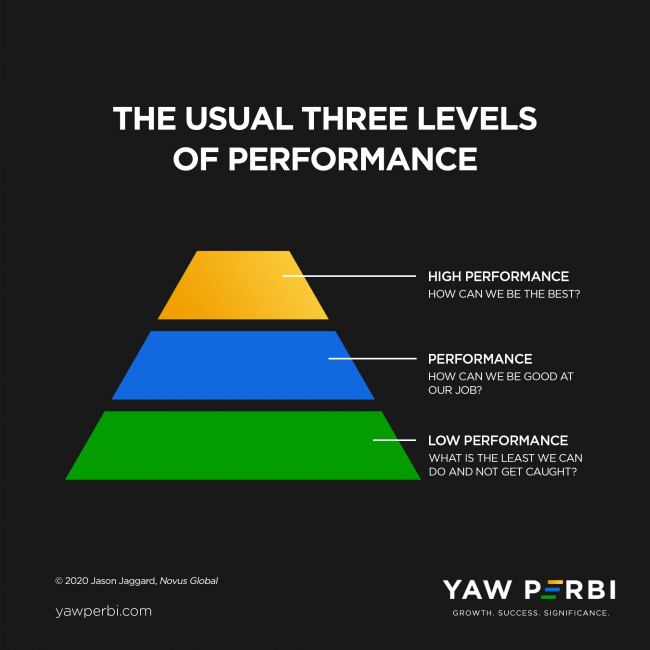
“Can You Go Beyond High Performance?”
“Can you go beyond high performance?” That’s a penetrating question Jason Jaggard, founder and CEO of the executive coaching firm Novus Global, asks in his powerful and popular article that bears that title. My good friend and StrengthsFinder coach, Dan Leffelaar, who is COO and partner at Novus Global, had exposed me to the company after he joined. Later he would introduce me to one of their very competent coaches, Joseph Thompson. It was Joseph who then drew my attention to this article even before we would have our first formal coaching session. By the way, I’ve said it before and it’s worth repeating, never hire a coach who doesn’t have a coach!
DIFFERENTIATION–OR WHATEVER YOU CALL IT
It is not uncommon for managers to categorize workers in the marketplace into three: low performers, performers and high performers. Over a decade ago, I remember reading about this idea from long time General Electric CEO Jack Welch’s book Winning. He called it differentiation, separating the sheep from the goats. According to Jack, differentiation is a process that requires managers to assess their employees and separate them into three categories in terms of top performance: top 20 percent, middle 70, and bottom 10. Then—and this is key—it requires managers to act on that distinction.
Whatever different percentages one uses to divide the three levels (and some just use the Pareto principle to divide the top 20% from the remaining 80%), the questions the people in each band ask themselves that result in their kind of performance are intriguing:
- Low Performers–“What is the least we can do to get by–and not get caught?”
- Performers–“How can we be good at our job?”
- High Performers–“How can we be the best?”
Often the morale of the story is “be the best,” be a high performer. Or, in the precious words of my dad’s alma mater (in Latin), Vel primus vel cum primis. To wit: either the first or with the first. But that is precisely the problem. High performers typically stop growing because they feel (or are made to feel) they are the best, or among the best, and have hit their peak when that is far from the truth! That’s the challenge of comparing ourselves to others instead of to our own potential. Don’t forget the saying that “in the land of the blind, the one-eyed man is king.” What is high performance about one eye just because everyone else you’re compared with is blind?
In fact, not only does Jason point out two common mistakes of high performers here but Novus Global as a practice firmly believes “attracting and retaining high-performers is a mistake and doing so creates a predictable set of problems.” You probably have met a lot of high performers who are still unhappy. Barring greed and envy, could Abraham Maslow’s observation be the cause? “If you plan on being anything less than you are capable of being, you will probably be unhappy all the days of your life.”
META-PERFORMANCE
So “can one go beyond high performance?” remains the question. “What comes after high performance?” I’m glad you asked. “If your team doesn’t have a clear and compelling answer to the question “What comes after high performance?” then you absolutely have an unnecessary cap on the possibilities of your leadership and the impact of your organization,” says Jason. The answer lies in a word he’s coined: meta-performance. And this is “meta” is not like “meta-data” but “meta” as in “metamorphosis,” like a caterpillar transforming into a butterfly. A meta-performer isn’t committed to being the best (“how dull,” Jason says)… a meta-performer is committed to constantly exploring capabilities.
Unlike “What is the least we can do to get by–and not get caught?” (Low Performers), “How can we be good at our job?” (Performers) or “How can we be the best?” (High Performers), Meta-Performers ask themselves, “What are we capable of?” That is a potent question in and of itself, but to process that with a competent and caring coach is even more powerful!
I often say to people, I may not have been the best of medical students (I was a low performer) but I was a very good doctor (high performer). But as good a doctor as I was, the question of what I was capable of sent me on a totally different trajectory from my peers, from authoring books and motivational speaking through military experience and peacekeeping with the United Nations, to pastoring, restarting life as a Canadian immigrant and becoming CEO of a number of non-medicine related ventures, some with a budget of a few million dollars.
Meta-performance is akin to what my mentor John C. Maxwell calls The Law of the Rubber Band: Growth Stops When You Lose the Tension Between Where You are and Where You Could Be. The meta-performance life happens somewhere between feeling ‘just right,’ taut enough to be best at tying things up, to tearing up because we fail to embrace our God-given limits. Often times, we are poor judgers of thse book ends, and having a discerning coach to assist on this journey is vital.
“IMPOSSIBLE” ACCORDING TO WHO?
In what area(s) of your life have you lost your stretch and settled? Create some specific means for stretching in these areas of your life. Go back to your 2021 goals and ensure they’re not only S.M.A.R.T. but that they also STRETCH. Remember, “Only a mediocre person is always at his best,” saysW. Somerset Maugham, putting things in a way that hits home, hard. “Ouch,” says the best performers.
Walt Disney used to say, “It’s kind of fun to do the impossible.” I know the feeling, a little bit. Nelson Mandela was right: “It always seems impossible until it’s done.” I find it not only a powerful meta-performance question to ask “What am I capable of?” but also in line with that to inquire, “What sort of person must I become to be capable of that?” Then with Almighty God’s help, “just do it,” do the “impossible.”
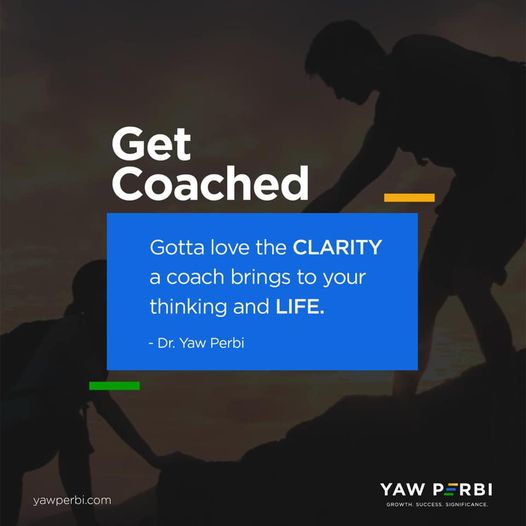
50 Shades of Coaching
Here is a list of about 50 kinds of coaching:
❖ Academic Coaching: Helping One Achieve Academic Excellence
❖ ADD/ADHD Coaching: To Understand the Most Common Learning Disorder – Attention Deficit Disorder / Attention Deficit Hyperactivity Disorder
❖ Alternative Lifestyle Coaching: To Get You Motivated, Strengthen Your Commitment and Re-align Your Goals
❖ Athlete Coaching: To Help Athletes Live a Balanced Life, Both Personally and Professionally
❖ Assessment Coaching: Walking Through Behavioral, Personality and Other Assessments Like the DISC
❖ Bereavement Coaching: Walking Through Painful Events with a Like Mind
❖ Business Coaching: Your Way to Business Success
❖ Career Coaching: Your Way to Fulfilling Your Financial Dreams
❖ Christian Life Coaching: Your Way to Emotional Maturity and Spiritual Fruitfulness
❖ College Entrance Coaching: Helping You Attend the School of your Dreams
❖ Communication Coaching: Opening Up the Link Between People
❖ Conflict Coaching: Working One on One to Achieve Balance
❖ Co-Parenting Coaching: Helping Divorced Parents Create a Positive, Workable Parenting Relationship
❖ Couples Coaching: Improving Communication Between Partners
❖ Creativity Coaching: Creative Struggle is Integral to the Life of the Artist
❖ Divine Purpose Coaching: To Re-Identify and Connect with One’s Centre
❖ Divorce Coaching: Helping People Transition to a New Life
❖ End of Life Coaching: Helping Those Left Behind
❖ Entrepreneur Coaching: For More Than Starting up a New Business
❖ Ethics Coaching: Living with Authenticity
❖ Executive Coaching: Moving the C-Suite On an Up to Take Your Team to the Next Level
❖ Family Coaching: Helping Families Work Through Difficult Issues
❖ Health and Wellness Coaching: Focusing on the Whole Being
❖ Holistic Health Coaching: Finding the Light at the End of the Tunnel and Balancing the Mind, Body and Spirit
❖ Laughter Coaching: To Bring More Lightness and Freedom
❖ Leadership Coaching: Putting You in the Right Direction to Chart the Course for Others
❖ Life Coaching: Your Way to Personal Success
❖ Men’s Empowerment Coaching: Helping Men Succeed with Excellence
❖ Military Transition Coaching: Helping You Adapt to Civilian Life
❖ Motivational Coaching: Helping One Achieve Personal Excellence
❖ Nature Coaching: Helping to Become One with Nature
❖ New Age Coaching: Self-help and New Thought Modalities
❖ Organizational Coaching: Clearing the Way to Clarity and Direction
❖ Parenting Coaching: Helping Parents Communicate and Understand their Children
❖ Pastoral Coaching: Coming Alongside Shepherds of God’s People
❖ Peer Coaching: Coaches Coaching Coaches
❖ Personal Development Coaching: Centers Around the Aspects of One’s Personal life
❖ Personal Finance Coaching: Your Way to Financial Freedom
❖ Physician Coaching: Helping Physicians Find a New Journey
❖ Recovery Coaching: Your Way to Recovering with Success
❖ Relationship Coaching: Building Personal and Professional Relationships
❖ Retirement Coaching: Transitioning to a New Life Stage
❖ Sales Coaching: Your Way to Increased Success and Profitability
❖ Self-Esteem Coaching: Helping People with Feelings of Value and Worth
❖ Singles Coaching: Helping Singles Find Healthy, Loving Relationships
❖ Special Needs Coaching: Helping Disabled Families and Individuals
❖ Spiritual Coaching: Helping People to Connect to the Divine
❖ Stress Management Coaching: Helping People Identify and Reduce Stress
❖ Success Coaching: Your Pathway to Personal and Professional Success
❖ Transitional Coaching: Helping People Through Big Life Changes
❖ Transpersonal Coaching: Finding Your Greatest Potential
❖ Weight Loss Coaching: Discovering New Healthy Lifestyles
❖ Women’s Empowerment Coaching: Encouraging Women to Embrace Their Talents
❖Youth Empowerment Coaching: Encouraging Young People to Discover and Fulfill Their Potential
This list is an adaptation of a list of 52 Life Coaching Niches Working Miracles Everyday by our coaching partner Barbara Wainright. You may go here to download a free copy of the book to discover which coaching niche is right for you!

It’s Mid-Year. Time to Close Growth Gaps.
One of my goals at the beginning of the year was to record a short video each week to pep people up in LIFE–Leadership, Integrity, Family, Entrepreneurship. Although speaking-wise I am an award-winning Toastmaster and have been on various media, including hosting television programmes even way back in my medical school days and early professional life, somehow I couldn’t bring myself to starting a YouTube channel and recording something ‘short and sweet’ regularly for my colleagues and coachees.
If today the January goal can now be marked as “done,” having recorded something every single week between then and now (June), it is because I had accountability to close a certain growth gap. The accountability I got was first from my Growth Mastermind group where I shared by goal at the beginning of the year. Exactly on January 15, one of the members, a U.S.-based consultant with Accenture, sent a group WhatsApp message reminding me of my action point to start recording that day. Did I feel ready? No. But to keep my word, I did it anyway! Apparently, we hardly ever ‘feel ready’ for anything. At some point we’ve got to “just do it!” It was Bruce Springsteen the musician who once said, “A time comes when you need to stop waiting for the man [male or female] you want to become and start being the man you want to be.”
MY GROWTH GAPS
In the very opening chapter of his masterpiece on personal growth (Maxwell 2012, 3-9), Dr. John C. Maxwell lists eight growth gaps people get trapped by:
- The Assumption Gap–“I assume that I will automatically grow”
- The Knowledge Gap–“I don’t know how to grow”
- The Timing Gap–“It’s not the right time to begin”
- The Mistake Gap–“I’m afraid of making mistakes”
- The Perfection Gap–“I have to find the best way”
- The Inspiration Gap–“I don’t feel like doing it”
- The Comparison Gap–“Others are better than I am”
- The Expectation Gap–“I thought it would be easier than this”
What had been keeping me from shooting my video snippets and starting my own YouTube channel were the Mistake and Perfection gaps. Those two, I find, are actually two sides of the same coin. There was a ton of information online about how to/not to shoot videos. Now, having 10,000 friends and followers on FaceBook and being well-known and respected in certain circles I didn’t want to come across as a jerk! I was being paralyzed by lighting issues, how my little home office should be arranged, which background would be the best, whether my phone camera was good enough etc. etc.
In fact, I look back with a bit of embarrassment at my first YouTube video which I shot in my decade-old comfy sweater with a Covid-19 bushy hair look, yet I’m so proud that I took the dive. Mistakes and failures are the price ticket to improvement and innovation. No price, no prize. My parents’ generation used to ridicule ‘Made in Japan’ products. My generation has high respect for everything Japanese, from Toyota and Honda through Yamaha to Sony. The Japanese were ridiculed as copycats with poor quality products but the kaizen principle of continuous improvement has brought them this far. Today’s generation has no paradigm of a bad Japanese product. They’ve constantly closed their mistake and perfection gaps. Now, some laugh at China the same way. China would laugh last if they too continually close their growth gaps because guess what? “A mistake is simply another way of doing things,” according to author and professor Warren Bennis. After 10,000 hours of practice, you and I can become geniuses at anything, as my fellow black Canadian, Malcolm Gladwell, asserts in Outliers, largely based on his interpretation of Anders Ericsson’s research.
TO MY FELLOW MISTAKE-AVOIDERS
The desire to find the best way and to be the best is good but I learnt from my mentor John Maxwell looking for the best way can actually be getting things backward. We rather have to get started if we want to find the best way. He says, “it’s similar to driving on an unfamiliar road at night. Ideally, you’d like to be able to see your whole route before you begin. But you see it progressively. As you move forward, a little more of the road is revealed to you. If you want to see more of the way, then get moving“ (Maxwell 2012, 7, emphasis mine).
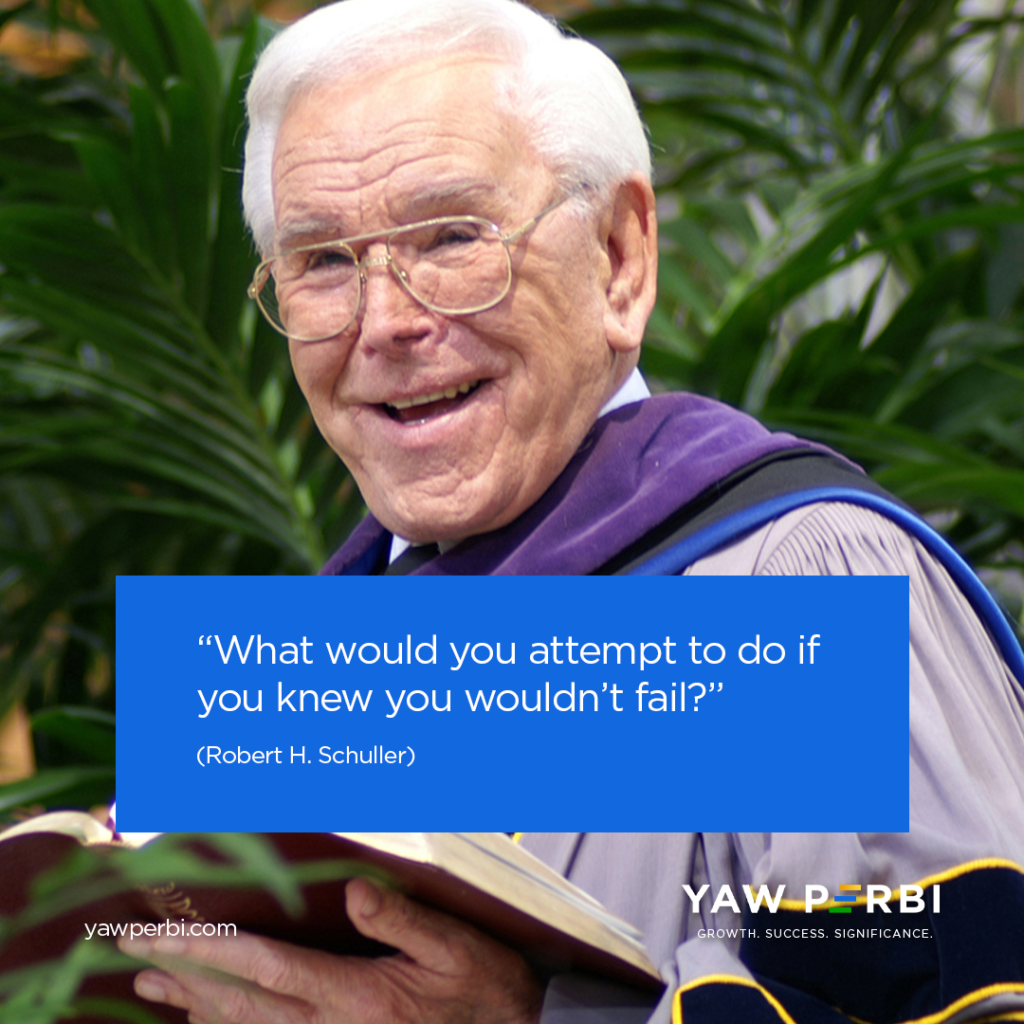
Such powerful words from Schuller’s ‘Hour of Power’ that run for 40 years! What a poignant question!
I once met the American Christian televangelist, pastor, author and motivational speaker Dr. Robert H. Schuller (picture above) in the mid 1990s. As a World Vision Youth Ambassador, my cohort had the privilege of visiting his ‘all glass’ Crystal Cathedral, singing there (oh the acoustics!) and appearing live on his weekly Hour of Power television programme which be began hosting in 1970 until his retirement in 2010. He is noted for many famous quotes but one that has most gingered me to overcome my mistake and perfection gaps has actually been this poignant question of his: “What would you attempt to do if you knew you wouldn’t fail?”
CONCLUSION
So! Half of the year has gone. If you find there’s a gulf between your year-start goals and your mid-year achievements, it’s a growth gap. Ask yourself: “how do I need to grow to close this gap?” If we would resolve to grow and close the assumption, knowledge, timing, mistake, perfection, inspiration, comparison and expectation gaps, we will end the year smiling. Focus on your growth, not so much on your goals. Then you will grow to hit them. I have, in my video-shooting goal. Now off to the rest!
Reference
Maxwell, John C. 2012. The 15 Invaluable Laws of Growth. New York: Center Street.
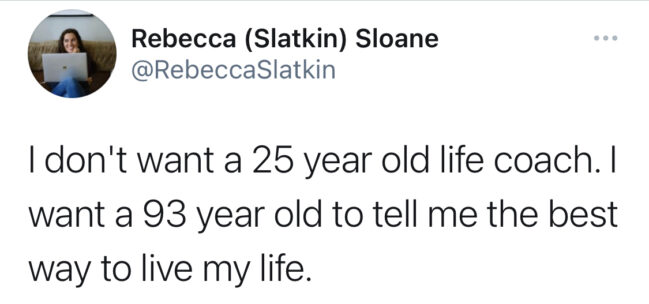
A Most Misunderstood Art: Life Coaching.
This tweet by Rebecca Sloane garnered so many responses last week. And it really ticked me off. It said, “I don’t want a 25 year old life coach. I want a 93 year old to tell me the best way to live my life.” It was sassy and seemed sensible at first sight, on the surface, but I just couldn’t shake it off or let it go scot-free. I’ll tell you why. To be clear, I’m going after the thought; not the person. “Ideas have consequences,” you know.
HUMILITY IS AN ASSET
In the first place, with humility anyone can learn from anyone. Everyone can learn something from anyone. The older can learn from the younger, atheists from people of faith (and vice versa), Christians from Muslims (and vice versa), CEO from new hire etc. This was actually better put by Bill Hybels during one of his Global Leadership Summits I attended: “Armed with enough humility, leaders can learn from anyone.” We can learn from children. Heck, we can even learn from flora and fauna! The greatest teacher that ever lived would place a little child in front of his class and say, “unless you change and become like children…” The good book says, “go and learn from the ant.” With enough humility, everyone can learn something from anyone and anything. Point made.
More substantively, this statement of Rebecca’s is a gross misunderstanding of coaching and as a certified professional coach I would like to set the record straight.
COACHING IS…
Apart from a number of group coaching sessions I run, I am personally dedicated to about a dozen one-on-one coachees, mainly C-level executives ranging from a CEO in agribusiness to deputy CEOs in mining and banking. How does a trained medical doctor get to coach these leaders in such different fields? Meanwhile, some of my coachees are much more advanced in age than me as well. What do I have to offer them then?
Coaching is an inspiring and empowering process that utilizes cogent questions to draw out and clarify thoughts and desires and facilitates a path and framework for their successful implementation for the growth, success and significance of the coachee. As my friend Barbara Wainright, a certified professional coach and trainer of coaches herself, puts it, “Coaching is about empowering your client by asking questions, facilitating strategic planning and monitoring tactical execution.” That is the number one tool of a coach: questions. In fact, with their penchant for asking question upon question, children would probably make much better coaches than adults with a little training and guidance! Yes, that’s how come a 25-year old can coach the writer of the tweet and anyone else twice or thrice their age.
I know I’ve hit a spot whenever a coachee goes, “good question.” The questions a coach asks bring clarity to one’s thoughts and desires, the coaching process inspires coachees to want to be the best versions of themselves they dream of and provides a framework of accountability to make their own word come true. One of my favourite preambles I love to hear from coaching clients is, “I’m beginning to realize…”
Successful life coaching isn’t about the coach–whether they are a 25-year old novice or a 93-year old veteran. It isn’t about what the coach knows, what they’ve accomplished, or even what they are doing in life. It is all about the client.
In fact, as Ms. Wainright reiterates, “coaching is about empowering your clients to decide for themselves what their goals are. It’s about Socratic Questioning and attentive listening. Coaching is about understanding your client’s needs, goals, desires and life purpose. Coaches help their clients to identify and clearly articulate their goals and dreams. Coaches help their clients to remain accountable and help strategize the action steps required to achieve their objectives.”
COACHING ISN’T COUNSELLING OR CONSULTING
I have been wanting to make these distinctions between coaching, counselling and consulting clear for quite a while as even prospective clients sign up for coaching with me expecting a masterclass or therapy session of sorts. Ms. Sloane’s tweet was the last straw that broke the camel’s back. As a student of Dr. Robert J. Clinton’s work at Fuller Seminary, I am of the opinion that coaching, counselling, and consulting are all types of mentoring (see an earlier blog here). Counselling, consulting and coaching have at least one thing in common: they all require great listening skills.
However, counselling is about helping your client by listening and offering advice and sharing coping skills. Consulting is about having all the answers and solutions to help your client with a specific task (hopefully after listening well). There is some form of mentoring (I’m not sure what to call it, perhaps ‘combo-mentoring’?) that combines coaching, counselling and consulting where the mentor empowers the mentee by asking questions, sharing valuable experiences, giving advice for growth and solutions for success. Strictly speaking, that isn’t life coaching in the purest sense of the art.
As may be obvious to you by now, counselling, consulting, and this combo-mentoring all require one to be significantly knowledgeable about the issues being addressed. That would make Rebecca Sloane’s tweet understandable but coaching on the other hand, requires the ability to ask contemplative questions, listen incarnationally, and ask even more profound follow-up questions till the client finds their own answers and makes their own commitments. Consequently, the coach doesn’t need to even know about the client’s field or have experience in the area of life they want to be coached in to help them. With the others, the professional is the driver; with coaching the client is.
DEAR REBECCA…
So dear Rebecca, a life coach doesn’t tell you anything, let alone how best to live your life. There are over 50 coaching niches–from life coaching to executive coaching to career coaching. None of them tell you how to live your best life but they will set the table for you and provide a menu of questions for you to figure out what your life meal should comprise of. For sure, find a 93-year old counsellor, consultant or combo-mentor to tell you how best to do life but if it is a coach you’re really looking for, even a 25-year old novice would do. It is about their questions; not their answers. It’s about you; not them.
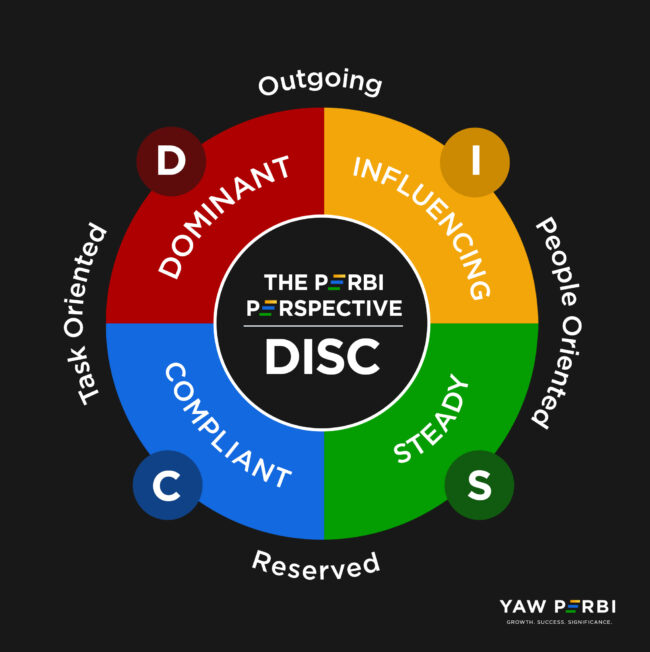
Getting DISCed is as Important as Getting Vaxxed!
It’s amazing how much most people know about subjects in our world, literally from Archaeology to Zoology, but very little or no ME-logy! In my book, Cutting a Straight Path: Leading with Self-Awareness, I ask these poignant questions:
- How can you live with yourself without knowing who you are?
- How can you be true to what you know little or nothing about: yourself?
- How can you succeed in life, self-actualize, without first becoming self-aware?
- How can you authentically lead others without first learning to know yourself?
- Have you ever felt frustrated why others are hesitant to follow your lead?
“Maybe it’s time to check yourself as a person and as a leader,” is my conclusion. Yes, it’s about time! Indeed, the Chinese have a powerful saying, “Before preparing to improve the world, first look around your own home three times.” Forget about authentic living, let alone authentic leadership, without self-awareness! So welcome to home base. Self-awareness is the starting place of all true and lasting success.
SELF-DISCOVERY THROUGH THE DISC
Self-awareness comes basically by introspection (by ourselves) and feedback (by others). Both however, are greatly enhanced by assessment tools, just like magnifying glasses help us see tiny objects and the binoculars enables us to view distant things closely and clearly. I have found the DISC as an amazing personal assessment tool that is incisive and powerful in the quest for self-awareness. Since 1972 it has been used by over 50 million people to increase self-awareness, stimulate and guide growth and thus increase chances at personal success. It is used to engender teamwork, communication and productivity in the workplace. The DISC has saved many a marriage, including mine!
DISC assessments are used in thousands of organizations around the world, from multilaterals and multinationals to government agencies and Fortune 500 companies, nonprofits and small businesses. Recently, we were privileged to serve the Centre for Disease Control Foundation in Atlanta, USA with nearly 150 of these assessments as they train medical leaders in about 30 nations of the world.
SO WHAT EXACTLY IS DISC?
DISC is an acronym that stands for the four main personality profiles described in the model: (D)ominant, (I)nfluencing, (S)teady and (C)ompliant.
People with D personalities tend to be confident and place an emphasis on accomplishing bottom-line results.
People with i personalities tend to be more open and place an emphasis on relationships and influencing or persuading others.
People with S personalities tend to be dependable and place the emphasis on cooperation and sincerity.
People with C personalities tend to place the emphasis on quality, accuracy, expertise, and competency.
The DISC system we use at YAW PERBI in partnership with People Keys generates 41 personality blends from these basic four, just like many colours of the world are generated through the three primary colours. There’s one I used to coach international students in Canada that was limited to 28 personality blends. What we use now is like the difference between a regular car and a four-wheel drive. As they like to say at People Keys, “people are different, true, but they are predictably different.”
CONVICTION, VISION & MISSION
Our conviction at YAW PERBI is that since every true and lasting success begins with self-awareness, then everyone must have easy and affordable access to self-DISCovery! ACCESS FOR SUCCESS, please! Everyone has a right to self-awareness. We need a DISC Revolution!
Our vision is to see a world of awareness through every individual’s self-DISCovery. We are on a mission to democratize the DISC personality/behavioral assessment until no one is left in the dark. We want to recalibrate all leadership development to begin with self-awareness at the core through the Perbi Perspective DISC is a great start.
CHIEF CORNERSTONE FOR THE CHIEF-LEVEL LEADER
When you read my article on how I build leaders differently now (compared to 10-15 years ago), you will understand my seriousness about this issue of recalibrating all leadership development to begin with self-awareness. People have big, fat leadership books and terabytes of leadership materials and yet have next to zero knowledge of themselves. What sense is there in that? I was telling a certain Christian leader the other day that he can forget the list of a dozen books people typically ask me to recommend for leadership training and development. The only two books his emerging leaders need to learn almost everything they need to know about leadership are a self-awareness printout of their DISC assessment and the Scriptures. Every other book is garnishing.
In all the major success paradigms, praxes and paths—from Emotional Intelligence to Authentic Leadership—self-awareness is first base, the chief cornerstone. I increasingly get alarmed when I encounter C-level executives, both in the public and private sector, who have never taken a personality assessment like the DISC!
STRATEGY AND HOPE
Some say hope is not a strategy but I beg to differ. (I’ll leave that argument for another day, another blog). I have hope that together we can strategically exponentially multiply impact through an army of Accredited DISC Coaches and Certified Behavioural Consultants while significantly creating thriving businesses and income for all! Just like our governments wish to get everyone vaccinated, we at YAW PERBI desire to get everyone DISCed! The former may be controversial to some, but you had better not second guess the latter. Everyone has a right to self-awareness to grow and succeed. Would-be authentic leaders really have no choice in this primary matter. We need a DISC Revolution!
P.S.
If you want to join the DISC Revolution by becoming an Accredited DISC Coach or a Certified Behavioral Consultant click here. Anyone who wants to get DISCed personally may start here.
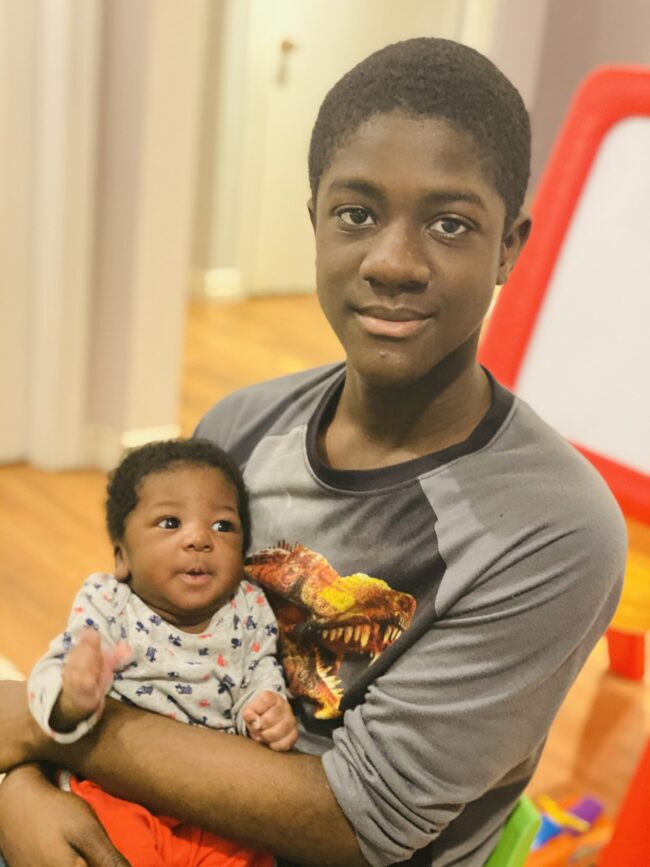
Family Foundations No One Lays Yet Everyone Needs
One of the most stupid things I’ve ever done is to travel 10 whole years into marriage before ever seeking formal post-marital counselling. After the several pre-marital sessions lasting many months in 2006, Anyele and I went in the power of that for a decade until we felt we needed further formal, external help. Why on earth did we do that?
Come to think of it, every 5,000 km or so we were changing the oil in our car and getting it serviced yet not so with our marriage. Doesn’t every marriage need regular marriage maintenance? Why wait till we’re sick before we see a doctor when we can at least do annual check-ups? In fact, I would say we came from a culture where seeing a counsellor connoted there was a pathology; and not so much a maintenance thing.
Friends, I’ve had several conversions since August 12, 2006 that have better aligned and further fortified what I thought were already ‘excellent foundations.’ Sometimes there’ve even been foundational cracks I’ve had to fix (and God knows I’m not done). For time to time I’ve come across new information that has caused me to repent, have a change of mind, and realign our foundations to keep this family building strong and lasting.
EXAMPLES OF FAMILY FOUNDATIONS TO REVISIT
Feel free to say “shame on you Yaw” but I had never heard of a family genogram until barely five years ago! How could such an important tool and exercise not have been part of our foundations when we set out a decade-and-a-half ago? And if you’re asking “what the heck is that?”, then trust me, you don’t even know you need one until you eventually discover it. Afterwards you would wonder how in the world your family had been surviving without one. I say ‘surviving’ because you will then notice that what you thought was ‘thriving’ wasn’t quite so.
Then there are basic tools for connecting with spouse and children on a deep emotional level we only received in the last five years. We learnt the 10/10 from the Pellmans and Temperature Reading from the Scazzeros. “Love your wife,” yes I want to. “Respect your husband,” yes she wants to. But how? The Kraemers also gave us tools for this.
And all this is for a good-looking couple who had a pretty solid family heritage, coming from a few generations of good Christian homes, being smart, leaders of our church youth fellowship who had lived virtuously and gotten married as virgins. We even themed our wedding “a celebration of purpose, passion and purity.” Alas! We who ‘had it all’ have realized there are family foundations everyone needs yet almost no one lays. The very marriage mentors who have been blessing us with these paradigms, praxes and practical tools are passionate about their ministry of marriage mentorship today precisely because they themselves didn’t have these when they were our age!
Family is a BIG deal. It is the basic unit of society, just like the cell is for all biological life and the atom is for all matter. Yet the thing about family foundations is this: just like finances, very little about how to make it work well is taught in school about it. If one isn’t fortunate to have a spiritual community that provides quality family life information and formation, you’re in a hard place. There are many divorces that are preventable, if the foundations could be reconfigured. There are some we’ve been able to help save by God’s grace; and others… well… too bad, too late.
THE MOST IMPORTANT PART
Few will argue against the assertion that the most important part of a building, or anything else that is built for that matter, say a marriage, is its foundation. A ton of things have been said about foundations. Gordon B. Hinckley asserts, “You can’t build a great building on a weak foundation. You must have a solid foundation if you’re going to have a strong superstructure.” Adding his voice, David Allan Coe says, “It is not the beauty of a building you should look at; its the construction of the foundation that will stand the test of time.” The greatest teacher of all time, Jesus Christ, classifies life builders into two categories, wise and foolish, purely based on thee foundations they lay: the foolish build on sand, the wise build on rock.
My beloved mentor Peter Scazzero talks about foundations a lot in the Emotionally Healthy Leadership paradigms he teaches. And no wonder, since like the typical New Yorker he is, Pete is ever so familiar with the skycraping towers of Manhattan. This is how he explains the importance of digging deep foundations if we are to build life’s tall towers of significance:
Manhattan consists almost entirely of bare granite, a very hard and strong type of rock. To carry the weight of a 75 or 100 story skyscraper, foundations known as “piles” are used. These are concrete or steel columns hammered into the ground with a massive crane until they penetrate solid rock.
Some pilings go twenty-five stories under the ground. The heavy weight of the skyscraper is then distributed through each of the deep “piles” in the ground below. Together they are capable of supporting the structure’s enormous weight.
If the pilings are drilled in poorly, cracks eventually appear in the structure. Entire buildings may lean. Then they must be torn down or lifted completely so the piles can be reset – a costly and time-consuming process.
FAMILY FOUNDATIONS MASTERMIND
As you might be aware from a previous blog, “a mastermind group (often shortened to just ‘masterminds’) is a peer-to-peer mentoring group used to help members learn together, solve problems, birth new ideas and gain clarity with input and advice from the other group members.” For eight weekly sessions, from April 4 to May 30, I shall be walking along with a dozen leaders who want to re-examine their family foundations and receive new paradigms, praxes and practical tools to finally fix faulty family foundations. Inputs will include several book chapters, videos, articles, practical exercises, discussions and debates. Two special features and benefits will be FREE membership of an online chest of over 20,000 resources and a FREE DISC Personality assessment with a 37-age customized report!
You can be sure that “mastermind groups are great in holding each other accountable for the goals and outcomes each member comes up with themselves” (see here). Outcomes and outputs of this particular Family Foundations Mastermind are as follows:
- Paradigm Shift on the Prime Place of Family
- Ancient Wisdom Applied
- Current Family Systems Theories Tested
- Practical Relationship Tools (for emotional connection, communication, forgiveness)
- Family Genogram
- Behavioural Assessment
- Emotional Needs List & Action Points
- Family Mission Statement
- Hierarchy of Priorities Configuration
- Integrated Life Exploration & Commitment
Register here and let’s go back to basics. Let’s finally fix faulty family foundations that everyone needs to but hardly anyone does.

